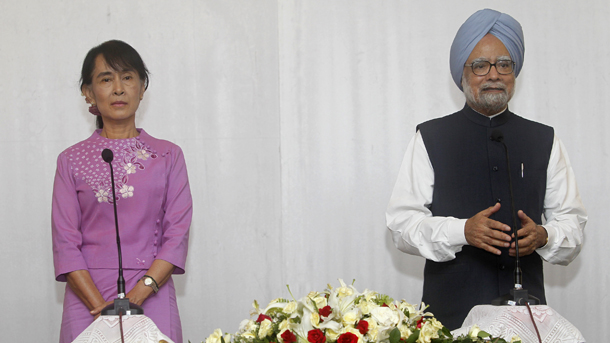Burmese opposition leader Aung San Suu Kyi will begin her first trip to India in nearly four decades in the capital New Delhi on Tuesday evening, according to a spokesman for her National League for Democracy (NLD) party.
“She will depart from Rangoon on Monday evening and will arrive in New Delhi on Tuesday afternoon. She will leave New Delhi on Nov. 17 and will be back to Rangoon the next day,” said NLD MP Ohn Kyaing.
The Nobel Laureate’s visit comes after an invitation to deliver the Jawaharlal Nehru Memorial Lecture in the Indian capital on Wednesday evening. She was asked by Indian Prime Minister Manmohan Singh during his trip to Burma in May.
During her visit, the 67-year-old is scheduled to meet with Singh, India’s Lower House Speaker Meira Kumar and External Affairs Minister Salman Khurshid as well as tour the national legislature.
Suu Kyi will also return to Lady Shri Ram College, where she studied political science as a young woman, to interact with students and will also drop by The Energy and Resources Institute in Gurgaon.
According to a press statement by the Indian Ministry of External Affairs, she plans to pay tribute at the Raj Ghat, where Mahatma Gandhi was cremated, and the Shantivana on the banks of the Yamuna River where Nehru was cremated.
On Friday, the mother-of-two will meet with Burmese refugees at the Prospect Burma School in West Delhi which she helps fund.
On Sunday, Suu Kyi will go to Bangalore, southern India’s technology capital, to meet students at the Indian Institute of Science. She is also scheduled to visit deprived areas of Andhra Pradesh to experience rural development works and women’s empowerment programs before flying back to Rangoon in the evening.
The trip will be Suu Kyi’s first visit in almost 40 years to the country where she grew up and studied. Her mother, Khin Kyi, worked as Burmese ambassador to India in the 1960s.
India initially supported Burma’s pro-democracy movement following the 1988 nationwide uprising against military rule, but later shifted to a policy of cultivating closer ties with the former junta as part of its “Look-East Policy.”
Burma’s opposition politicians hope that Suu Kyi’s India trip will encourage New Delhi to resume support for the democracy movement.
“Since the relationship between the two countries became mainly focused on economics, India’s interest on encouraging our pro-democracy movement weakened,” said Ohn Kyaing. “I personally hope that India will once again actively support us after this trip.”

















